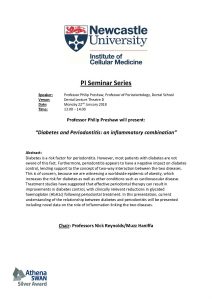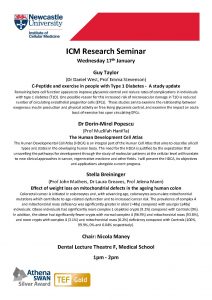We are very excited to announce our first seminar of 2018 which will be on Thursday the 18th January at 4pm in the Research Beehive room 2.22 at Newcastle University. Tea and coffee will be provided from 3:30pm.
We are delighted to welcome:
Professor Adrian Hayday PhD FRS, F MedSci
Glendinning Professor of Immunobiology, King’s College London & co-Lead, Clinical Academic Grouping, Genetics Rheumatology Infection Immunology & Dermatology King’s Health Partners & Senior Group Leader, The Francis Crick Institute, London
Talk title:
In search of natural tissue-immunosurveillance: the roles of epithelial butyrophilins
Synopsis:
Adrian Hayday trained as a biochemist, did his PhD studies in tumour virology, and pursued post-doctoral training at MIT where he characterised chromosome translocation breakpoints in human B cell lymphomas, and helped identify gamma delta (gd) T cells by being the first to describe gd TCR genes. On the Faculty at Yale University, he helped show that gd T cells occupy a distinct niche in lymphocyte biology, including disproportionate association with tissues rather than with lymphoid organs, and rapid responses to tissue-‘stress’. At a time when tumour immune surveillance was not widely accepted, his lab showed that mice lacking gd T cells are more susceptible to carcinogens. His group returned to London in 1998 to establish the Peter Gorer Dept of Immunobiology at King’s College London, then joined the Cancer Research UK London Research Institute (now part of the Francis Crick Institute) as a joint appointee in 2009. In recent years, his group has developed a strong programme in human immunology, including clinical trials applying gd T cells in immunotherapy. Amongst many honours, in 1997 he became the first biologist to win the William Clyde DeVane Medal, Yale College’s prestigious prize for scholarship, and he was awarded a FRS in 2016.
Website:
www.crick.ac.uk/research/a-z-researchers/researchers-d-j/adrian-hayday/biography/
Recent publications:
www.crick.ac.uk/research/a-z-researchers/researchers-d-j/adrian-hayday/publications/
If you would like to speak with Adrian during his visit, please contact Andrew Mellor (andrew.mellor@ncl.ac.uk).
The 2018 INE seminar list is included below for your convenience.
Best wishes,
Nicola Maney
INE Communications Officer
INE 2017-18
All talks are currently planned to take place at 4pm (3.30pm for Tea and Coffee with biscuits) in the Research Beehive, room 2.22 (except 17th May which is in the Baddiley Clark seminar room)
Thursday January 18th 2018
Prof. Adrian Hayday, CRICK institute/King’s College London
Title to follow; “lymphocyte function within tissues, and how those functions may contribute to human health and disease”
Thursday February 15th 2018
Dr Wafa Khamri, Imperial College London
Title to follow; “immune responses, cellular function and acute liver failure”
Thursday March 15th 2018
Dr Joanne Konkel, University of Manchester
Title to follow; “Immune cell networks at barrier sites, effects of tissue microenvironment on immune function”
Thursday 12th April 2018
Dr. Dean Naisbitt, University of Liverpool
Title to follow;. “chemistry of antigen formation and the mechanisms behind an aberrant T-cell-mediated immune response”
Thursday May 17th 2018
Baddiley Clark seminar room
Prof. Ben Wilcox, Professor of Molecular Immunology, Institute of Immunology and Immunotherapy, University of Birmingham
Title to follow; “Novel tumour antigens and unconventional T cell function”
June 2018 AGM Meeting –Durham (14th June, details to be confirmed)


